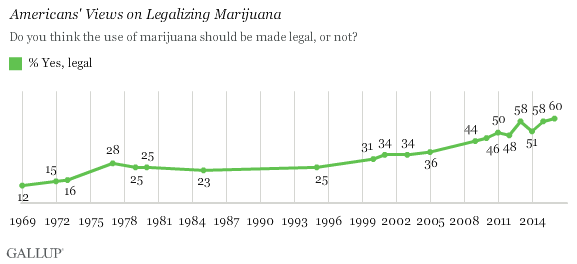Marijuana is becoming legal across the U.S., mostly because a lot of people have used it.
Americans knew very little about marijuana — the leaves, flowers, and stems of the cannabis plant — in the first half of the twentieth century. Few had any experience with it. Our widespread ignorance permitted federal bureaucrats and others to engage in a campaign of racist fraud. The baseless claims about marijuana included assertions that Hispanic and Black users were engaging in crazed rape and murder rampages.
This propaganda campaign resulted in the Marijuana Tax Act of 1937, which was a de facto prohibition of marijuana. That prohibition became explicit in the Controlled Substances Act of 1970, which also created the Drug Enforcement Administration.
By the 1970s, however, nearly half of the population had used marijuana and knew those claims were false. Indeed, there has never been a proven case of any marijuana user rendered violent by ingesting the substance.
So, despite the federal prohibition, several states decriminalized the drug, and a strong national mood supported that position. Moreover, President Jimmy Carter called for decriminalization of the drug in a message to Congress.
How the war on marijuana started
Carter’s successor, Ronald Reagan, and his wife Nancy, took a starkly different approach. The president asserted that marijuana was “probably the most dangerous drug in America,” outranking heroin and cocaine and ignoring far more harmful drugs such as pharmaceuticals, tobacco, and alcohol. By comparison, tobacco kills about 480,000 Americans every year, and alcohol kills about 100,000).
Fancying herself a criminal law theorist, Nancy Reagan declared that anyone who smoked a marijuana cigarette was “an accomplice to murder.” Criminal penalties and enforcement efforts increased greatly. Millions of Americans were arrested for marijuana offenses and thousands were imprisoned. The decriminalization movement was temporarily squelched.
But the actual experience of millions of Americans with the drug would eventually undermine the Reagan crusade.
It is true that some users of marijuana, especially new ones, may experience unpleasant albeit temporary psychological effects such as paranoia. Yet, for the most part, there is a wide range of positive sensations experienced by most users.
Real-life experience of marijuana beats propaganda
The collapse of the Reagan crusade was caused primarily by these favorable experiences of recreational users.
But it was also aided by mounting evidence that marijuana has unique medicinal qualities. For example, it can restore the appetites of cancer patients nauseated by chemotherapy. It can also reduce pain without creating the dependence often produced by opioids. And it is credited with controlling many types of epileptic seizures and relieving the symptoms of asthma.
As of late, although the federal prohibition is still on the books, enforcement has been far more contested territory. The Obama administration rarely prosecuted anyone who grew, possessed, dispensed, or used marijuana in compliance with state laws.
The Trump administration then made a push to reverse this attitude, while the now Biden presidency has a supposed pro-marijuana stance, despite alleged firings on grounds of prior drug use.
The future of marijuana legalization looks hopeful
Thirty-six states plus the District of Columbia have legalized medical marijuana, and 15 states, D.C., the Northern Mariana Islands, and Guam have legalized recreational use of marijuana by adults. In 2016, a Gallup poll found that 60 percent of Americans favor outright legalization.


California took the decision to legalize recreational marijuana in 2016, and Arizona, Montana, and New Jersey followed suit in 2020. With South Dakota joining them in July this year (2021), it seems likely that the drug will soon be legal in all 50 states as well as at the federal level.
This does not mean that marijuana will be legally consumable by minors. Evidence is fairly persuasive that frequent use of the drug by children, teenagers and young adults may hamper their intellectual and moral development. As with alcohol, the production, distribution and use of marijuana will be closely regulated in the foreseeable future. But that doesn’t stop the enormous benefits of legalization.
As the movement toward legalization proceeds, we should reexamine the millions of criminal sentences we have imposed on users through the war on marijuana. Today, 30,000 people are in prison for mere possession of marijuana, and many people are serving life sentences for marijuana distribution. Such sentences cannot be justified.
Only once we have fully decriminalized marijuana, and made whole the thousands imprisoned over the years can we start to restore the damage done by the senseless war on drugs.
To read more about the drug war, be sure to check out our cluster page by clicking on the button below.
This article was originally published on the Learn Liberty blog.
Updated by Joseph Simnett
This piece solely expresses the opinion of the author and not necessarily the organization as a whole. Students For Liberty is committed to facilitating a broad dialogue for liberty, representing a variety of opinions.

















